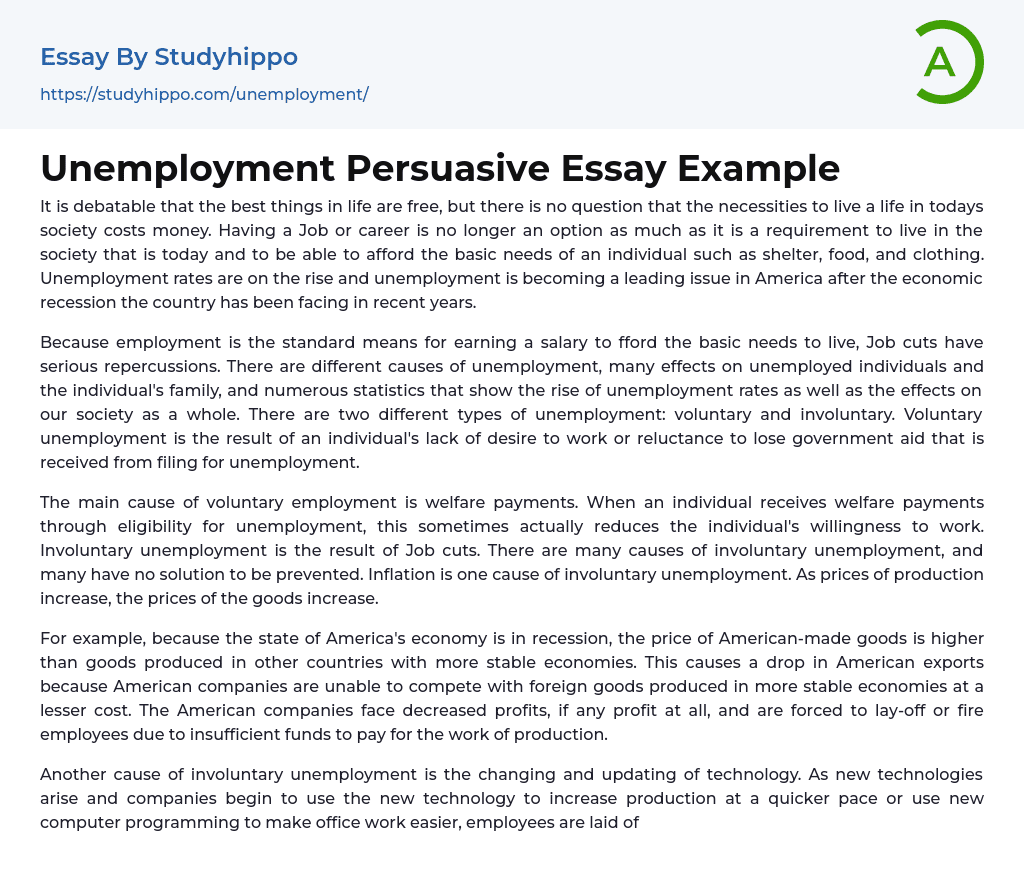Although there is a discussion about the value of free things in life, it is unquestionable that money is necessary for basic needs in society today. Having a job or career has become crucial to afford essentials like shelter, food, and clothing. The rise in unemployment rates and its significance as an issue in America can be attributed to the economic recession witnessed recently.
The repercussions of job cuts are significant because employment is the usual way to earn a salary and afford basic necessities. Unemployment has various causes, effects on individuals and their families, and statistics that demonstrate its increasing rates and impacts on society. Unemployment can be categorized into two types: voluntary and involuntary. Voluntary unemployment occurs when an individual lacks motivation for work or is hesitant to lose government aid received through unemployment benefits.
Voluntary employment can be influenced by
...receiving welfare payments, which may reduce motivation to work while on unemployment benefits. In contrast, involuntary unemployment is attributed to job cuts and has various underlying causes without predetermined solutions. Additionally, inflation contributes to involuntary unemployment as it leads to higher production costs and subsequently increased prices for goods.
Due to the recession in the American economy, goods manufactured in America have become more expensive compared to those produced in economically stable countries. Consequently, American exports have decreased as domestic companies face difficulties competing with cheaper products from stronger economies. Consequently, these companies experience reduced or no profits, which forces them to lay off or terminate employees due to insufficient funds for production expenses.
The introduction of new technologies in companies can result in involuntary unemployment as employees may be lai
off when their jobs are replaced by more cost-effective technology. Additionally, various factors have contributed to the rise in unemployment rates in the United States starting from 2007.
The financial crisis in the United States, caused by excessive credit card usage, has led to higher unemployment rates. The country's economy relies on its GDP, which is determined by consumer spending. In recent years, American consumers have increasingly opted for credit card purchases, resulting in a significant amount of goods being bought on credit. According to a May 2010 report from the Federal Reserve, consumer debt reached $2.5 trillion with 576.4 million credit cards in circulation as of March that year. This widespread use of credit negatively impacts the economy and has resulted in substantial debt and bankruptcy among lenders. Consequently, this crisis has had far-reaching effects across various sectors, including an increase in bankruptcies and widespread job cuts and layoffs. Additionally contributing to high unemployment rates in the United States is the real estate bubble crisis.
The severe crisis in the banking industry and lending sector resulted in significant losses. This crisis was triggered by various issues such as refinancing, second mortgages, irresponsible lending practices, and unnecessary property valuations. The combination of defaulted mortgage loans and a limited number of buyers in the real estate market led to foreclosed properties being sold at lower prices. Moreover, banks incurred extra costs due to short sale procedures. As a result, banks faced further strain and numerous major financial institutions filed for bankruptcy. One notable example is Lehman Brothers' bankruptcy filing, which resulted in the loss of $600 billion worth of assets.
The Lehman Brothers and its associates
experienced major losses and significant liquidity issues. Numerous corporations and companies associated with the bank declared bankruptcy and initiated lay-offs. This crisis is also known as the subprime mortgage crisis of the United States. Besides banks and lenders, the automotive industry was severely affected. Many banks and lenders providing car and auto loans suffered from the mortgage crisis as well.
Due to the financial crisis, individuals faced challenges in securing loans for purchasing new vehicles. This led to a decline in automotive production and subsequent lay-offs. The unstable economy of the country also affected international trade, foreign exchange, and oil trade. The decrease in fuel trade resulted in higher fuel costs, which further impacted the decline in automotive sales. This downturn not only affected direct automotive companies but also other businesses associated with the industry.
- American Dream essays
- Barriers To Entry essays
- Capitalism essays
- Central Bank essays
- Compensation essays
- Consumerism essays
- Economic Development essays
- Economic Growth essays
- Economic Inequality essays
- Economic System essays
- Economy essays
- Employment essays
- Export essays
- Finance essays
- Free Trade essays
- Gross Domestic Product essays
- Human Development essays
- Income Inequality essays
- Industry essays
- Inflation essays
- International Business essays
- International Trade essays
- Macroeconomics essays
- Materialism essays
- Max Weber essays
- Microeconomics essays
- Minimum Wage essays
- Monetary Policy essays
- Monopoly essays
- Pricing essays
- Profit essays
- Recession essays
- resources essays
- Taxation essays
- Trade essays
- Unemployment essays
- Warehouse essays
- World economy essays
- Bank essays
- Banking essays
- Corporate Finance essays
- Credit Card essays
- Currency essays
- Debt essays
- Donation essays
- Enron Scandal essays
- Equity essays
- Financial Accounting essays
- Financial Crisis essays
- Financial News essays




